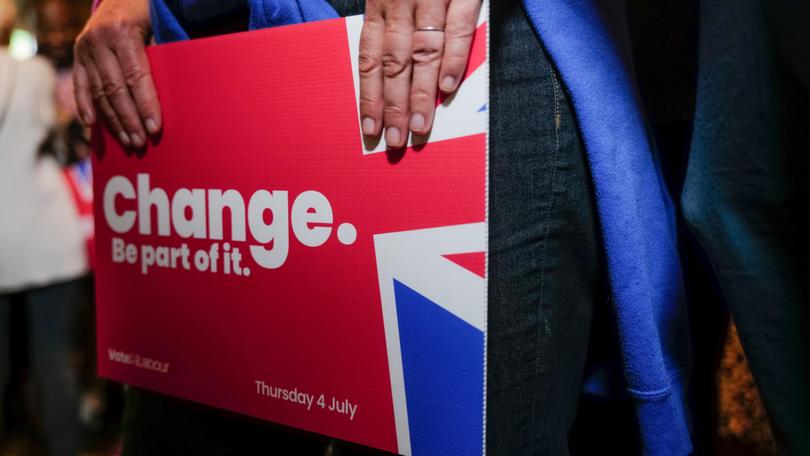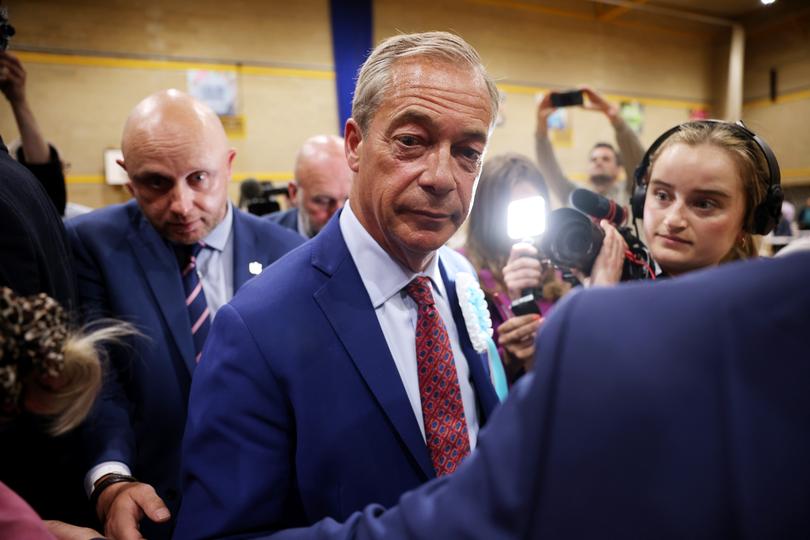UK election 2024: Labour landslide glosses over lost seats due to anger on left and right
Labour’s huge majority in the UK election conceals the serious dangers ahead for Keir Starmer.

The British vote has splintered and Labour is now under attack from both sides, the Muslim vote on the left and Nigel Farage’s Reform on the right.
Labour swept to power with a massive majority in what many will see as validation of Keir Starmer’s small-target strategy, borrowed from Anthony Albanese’s playbook of say-and-do-as-little-as-possible to squeak into power.
Unlike Albanese, Mr Starmer won a massive majority. Rishi Sunak called the victory at 4.42am, UK time, before Labour had even officially won the required number of seats for the majority that they were clearly on course to secure.
Sign up to The Nightly's newsletters.
Get the first look at the digital newspaper, curated daily stories and breaking headlines delivered to your inbox.
By continuing you agree to our Terms and Privacy Policy.“I have called Sir Keir Starmer to congratulate him on his victory,” Mr Sunak said.
“The British people have delivered a sobering verdict tonight, there is much to learn and reflect on and I take responsibility for the loss.
“To the many, good, hardworking Conservative candidates who lost tonight, despite their tireless efforts, their local records of delivery and their dedication to their communities, I am sorry.”
“We did it,” said a visibly relaxed and smiling Keir Starmer a short time later.
“It feels good, I have to be honest.
“Four and a half years of work changing the party, this is what it is for, a changed Labour party, ready to serve our country.”
Labour, and Mr Starmer, deserve to celebrate. In Scotland the Scottish National Party completely collapsed and Labour took out Conservatives in Tory heartlands, including party veteran Jacob Rees-Mogg in Somerset North and Hanham.
The Red Wall returned home but without enthusiasm for Labour.
Laura Mills, an NHS worker and mother of two in her thirties is a textbook voter in the seat of Newcastle-under-Lyme, near Stoke-on-Trent in the North.
Like the seat, she voted for Brexit and then switched from being a Labour voter in 2019 when she voted Conservative for Boris Johnson.
“The Tories have made a bit of mess of things,” she told The Nightly as she issued a blunt appraisal of Mr Starmer.
“He just doesn’t inspire me,” she said, as she wished for someone “strong and fair and Blairesque.”
“Jeremy Corbyn was a bit too left-wing for me and Keir Starmer, I just don’t think he’s a very strong candidate.”
That kind of widespread dissatisfaction gave rise to minor parties.
Keir Starmer’s play-it-safe approach led to just a tiny gain in their overall share of the vote – 1.7 per cent – to 35.4 per cent.
That’s despite the Conservatives suffering a 19.7 per cent in their share, which collapsed to just 22.8 per cent.
Nigel Farage’s new entrant Reform was the big winner with 14.5 per cent of the vote share.
Voters now understand that their vote is something they can spend, rather than an exercise of party loyalty.
The upside for Mr Starmer is that expectations are low but the downside is that, unlike Labor in Australia, he is unlikely to enjoy any extended honeymoon, if at all.
To his credit, Mr Starmer made a fine start with his victory speech.
‘Across our country, people will be waking up to the news, relieved that a weight has been lifted,” Mr Starmer said.
“A burden finally removed from the shoulders of this great nation.
“And now we can look forward again, walk into the morning, a sunlight of hope, pale at first, but getting stronger through the day, shining once again on a country with the opportunity, after 14 years to get its future back.”
But Labour’s huge majority conceals the dangers ahead for Mr Starmer.
Firstly there is the loss of the frontbench frontman Jonathan Ashworth who was ousted from one of the party’s safest seats in Leicester South by his Muslim voters.
Mr Ashworth suffered a 35 per cent swing as voters there opted for an independent. An Independent in Ilford North almost took out Wes Streeting, the Blairesque leading light of the Labour frontbench as he haemorrhaged 20.8 per cent in support.
No one expected those results.
“Crikey,” remarked More in Common pollster Luke Tryl.
“Every focus group we’ve done in the area suggests Wes is hugely popular, so I think this really does show that Labour have a bigger problem on the left - driven by Gaza - than we thought.”
Similarly, Jeremy Corbyn, the former Labour leader, now disendorsed, held on to Islington North, at the expense of his old party.
“Today, Palestine is on the ballot,” he said.
Sectarian and cultural politics is at play in the UK like never before and it is stunning and worrying for the major parties that they have broken through in a first-past-the-post system.
Overall, the Gaza factor led to Independents knocking out four Labour MPs.
Down south, in Bristol, another Labour frontbencher was taken out, this time by the Greens.
This speaks to the widespread disaffection with both parties and is one of the costs of Mr Starmer’s decision to offer as little as possible to voters in his efforts to reassure them.
On the right, Nigel Farage was the main beneficiary as his Reform party gobbled up Conservative support.
The post-Brexit infighting, dysfunction and incompetence took its toll as the party suffered a 22 per cent collapse in support.
Minister after minister, and potential leaders, including Penny Mordaunt, bowed out.

Waiting in the wings was Mr Farage and his Reform party.
Mr Farage, who has tried to enter the House of Commons seven times before, was finally victorious in Clacton.
He has been successful in transforming Britain from outside the parliament in driving the Brexit referendum, now he wants a replay - but for power.
He broke through the first-past-the-post system that has frustrated his attempts thus far to secure four seats for Reform.
“There’s no enthusiasm for Labour, there’s no enthusiasm for Starmer, whatsoever,” he said.
“In fact about half of the vote is simply an anti-conservative vote, this Labour government will be in trouble very, very quickly.
“We’re coming for Labour, be in no doubt about that.
“Believe me folks, this is just the first step of something that is going to stun all of you.”
Reform presents huge challenges to the Conservatives as the party’s efforts to rebuild are stymied by indecision from within about whether to pivot to the right or centre.
Labour and the decimated Conservatives will be hoping that minor party infighting will keep Reform at bay and prevent a French-style far-right hijacking of their national politics.
But Mr Starmer cannot bank on this, meaning the pressure on him to deliver on bringing down immigration and stopping small boats, quickly, is enormous.
Given that Mr Starmer has ruled out keeping the Rwanda deportation scheme as a deterrent, it is difficult to see how he can achieve what the Tories could not.
This will be further complicated if the French elect a far-right government on Sunday, weakening President Emmanuel Macron — the European leader in whom Mr Starmer has invested most heavily.
Mr Starmer’s landslide is a victory the left should savour but they would be unwise to ignore that the sun rose on a permanently changed political landscape where voter loyalty and tribal politics and safe seats are no longer certainties.
